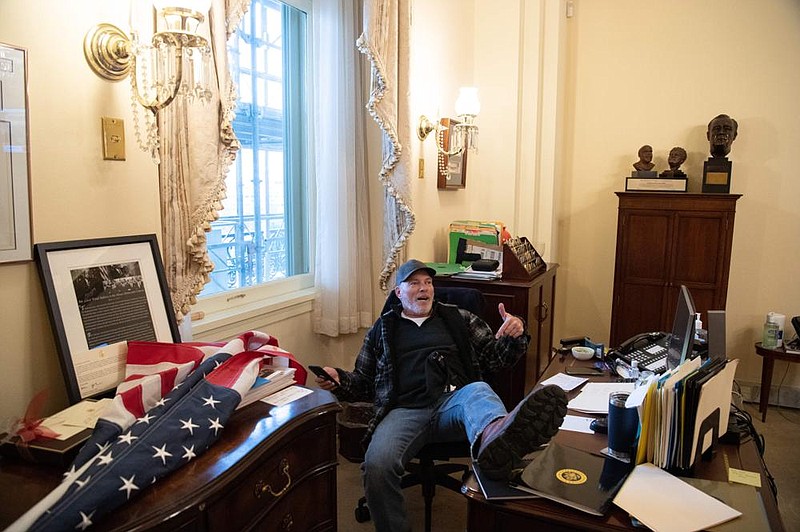A Gravette man will remain in federal custody pending trial because he is dangerous and a flight risk, a federal judge in the District of Columbia wrote Friday in a detention order.
Chief Judge Beryl A. Howell made a verbal ruling regarding Richard "Bigo" Barnett, 60, after a videoconference hearing Thursday.
On Friday, she put it down in a four-page order.
"Defendant's involvement in the Capitol assault and brazen conduct inside the Capitol and offices of the Speaker of the House pose an obvious danger, bolstered by his prior public actions while armed that prompted police attention, and ownership of an unknown number of firearms removed from his home before his surrender," Howell wrote. "Those firearms, his phone and the stun gun have not been recovered."
During the U.S. Capitol riot on Jan. 6, Barnett -- while carrying a stun-gun hiking stick -- entered the office of House Speaker Nancy Pelosi, propped his feet on a desk and took an envelope, according to charges against him. He left a quarter and a note saying, "Nancy, Bigo was here, you b," the charges say.
"This conduct was brazen," Howell wrote in Friday's order. "He bragged about what he had done after leaving the Capitol."
A photo of Barnett with his feet propped on a desk in Pelosi's office was shown by media outlets around the world.
Howell said Barnett was "one of the stars of this assault."
Barnett faces a felony charge of entering the Capitol with a dangerous weapon (the stun gun), which carries a maximum penalty of 10 years in prison. He also faces two misdemeanor charges, which together carry a maximum penalty of 1.5 years in prison.
During the past seven months, police in Fayetteville had twice been called because Barnett was armed in public at demonstrations near the Washington County courthouse, according to reports. Barnett wasn't arrested either time, but Howell said Thursday that he displayed "provocative behavior."
"To the extent that he had firearms, they're not part of this charge," Anthony Siano, Barnett's attorney, said during Thursday's hearing.
During a five-hour detention hearing on Jan. 15, Barnett's wife, Tammy Newburn, told a federal magistrate judge in Fayetteville that Barnett had guns but they were removed from the house the night before he surrendered to the FBI on Jan. 8. She said the guns were given to Mark Hesse, a friend of Barnett's.
A search was conducted of Hesse's house on Jan. 15, according to a search warrant affidavit that was unsealed this week in federal court in Fayetteville.
But based on comments that Howell made Thursday, Barnett firearms, stun gun and cellphone weren't found there. Hesse hasn't been charged with a crime.
When he surrendered on Jan. 8, Barnett told the FBI officers that they wouldn't find anything at the house he shares with Newburn and her daughter, reports say.
Barnett told agents: "If y'all go out there and do a search warrant, you can see all my s*. You ain't going to find nothing out there. ... I assure you I'm a smart man. There's not anything there," FBI Special Agent Jonathan Willett said during the Jan. 15 hearing.
Knowing that pictures of him were being widely circulated, Barnett didn't surrender immediately, Howell wrote.
Instead, he "arranged a time for his surrender that allowed him to clear his house of incriminating evidence," Howell wrote. "He even bragged to law enforcement about removing this evidence."
Howell concluded that Barnett is a danger to the community.
"The court finds that defendant poses a danger to the community because of his brazenly illegal conduct, pattern of armed disturbance, and access to firearms and weapons, like the stun gun, that remain missing," Howell wrote.
"He also poses a risk of flight, having admitted to taking evasive action of covering his face, using cash only and turning off location monitoring on his phone when he left D.C., bragging to law enforcement about removing incriminating evidence from his home before surrendering, and his partner admitted to having a 'safe house' where she met defendant on his return from D.C."
Howell's decision countermanded a Jan. 15 ruling by a magistrate judge in Fayetteville who was prepared to release Barnett on bond to house arrest.
During the hearing Thursday, Howell indicated that Barnett was participating from the District of Columbia jail. From Jan. 8 to Jan. 20, he was held at the Washington County jail in Fayetteville.
In Friday's order, Howell also wrote that Barnett would be remanded to the custody of the U.S. attorney general or his representative "for confinement in a corrections facility separate, to the extent practicable, from persons awaiting or serving sentences or being held in custody pending appeal."
